Sovereign Wealth Funds - The Last Bastion's of “Dumb Money”?
Stock-Markets / Financial Markets Feb 09, 2008 - 02:46 AM GMT In recent months, Wall Street has taken comfort in the idea that Sovereign Wealth Funds will come riding to the rescue of banks that are up to their eyeballs in subprime sludge. First Citigroup, then Merrill Lynch and a host of other commercial banks have reported receiving “injections” of capital to help them reinvigorate their balance sheets. Some $40 to $60 billion of new capital has been promised.
In recent months, Wall Street has taken comfort in the idea that Sovereign Wealth Funds will come riding to the rescue of banks that are up to their eyeballs in subprime sludge. First Citigroup, then Merrill Lynch and a host of other commercial banks have reported receiving “injections” of capital to help them reinvigorate their balance sheets. Some $40 to $60 billion of new capital has been promised.
After having stepped to the plate so willingly last year, the Sovereign Funds are now having second thoughts. The $8 billion loan to Citigroup made last year was more than likely made to protect their prior investments from an outright collapse. And the Chinese are becoming more sophisticated about their money as well. They are growing resentful that they are being considered the last bastion of “dumb money” for troubled banks. They may be right.
Lets get the record straight. These Sovereign Funds are not buying the subprime mortgages. They are lending money to these banks so that they, in turn, can lend money to us. It might disturb people to know that Citigroup agreed to pay the Sovereign Fund of Dubai 11%. What interest rate will Citi have to charge its customers to meet overhead and pay back that loan?
Consumer borrowing is slowing down.
WASHINGTON (AP ) -- Consumers increased their borrowing in December at the slowest pace in eight months - additional evidence that economic activity was slowing significantly at the end of last year. For all of 2007, consumer credit rose at the fastest clip in three years.
Consumer credit, as measured by the Federal Reserve, does not include any debt secured by real estate, such as mortgages or home equity loans. The December report showed that revolving credit, the category that includes credit cards, rose at an annual rate of 2.7 percent in December, a significant slowdown from a 13.7 percent jump in November.
Unfortunately, consumers haven't yet come to the realization that these loans have to be repaid.
Bank failures…prepare yourself for them.
U.S. News & World Report tells us that, “A tiny bank in Kansas City, Mo., has become the first bank in the country to fail this year—but it's unlikely to be the last.” Smaller banks with limited resources will likely have the most trouble this year, especially those that have made large commercial real estate loans. A banker reports to me that many businesses are now in arrears on their payments, since they are not being paid for work already done.
How well is your bank doing? I cannot answer that question, but Veribanc, Inc. will be out soon with their 4 th quarter report on banks. They are an independent rating service and rely on subscriber fees to pay the bills. The cost of a report is $10.00 for the first bank and each additional report has a reduced fee. They may be reached at (800) 442-2657 or by email at service@veribanc.com .
Reining in egregious credit card practices.
The House Financial Institutions and Consumer Credit Subcommittee introduced new legislation yesterday to curb unfair credit card practices. Increasing numbers of consumers are falling into arrears on their credit cards, causing an onslaught of fees and higher interest rates. Companies are cutting back on employees, causing even on-time payments to be credited late. Will the bill make it to a vote? Let your voice be heard.
Is the “recovery” faltering?
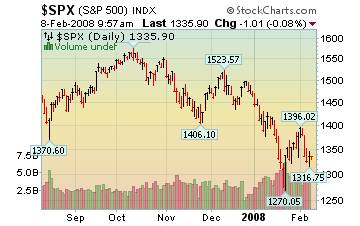 Wall Street pundits are arguing whether investors should pile back in to the market to take advantage of the “recovery” that they claim is taking place. Not so fast! Recoveries seldom come in this kind of environment. The S&P 500 is in the process of a “retest” of the January lows. Today the Commerce Department reports that wholesale inventories increased 1.1% in December. This is the largest gain in inventories since August 2006. What is more, sales at wholesalers dropped .7% in December, the largest decline in 11 months. It appears that shoppers sat on their wallets in the month of December, the single most important month of the year for wholesalers.
Wall Street pundits are arguing whether investors should pile back in to the market to take advantage of the “recovery” that they claim is taking place. Not so fast! Recoveries seldom come in this kind of environment. The S&P 500 is in the process of a “retest” of the January lows. Today the Commerce Department reports that wholesale inventories increased 1.1% in December. This is the largest gain in inventories since August 2006. What is more, sales at wholesalers dropped .7% in December, the largest decline in 11 months. It appears that shoppers sat on their wallets in the month of December, the single most important month of the year for wholesalers.
Who else is sitting on his wallet?
Berkshire Hathaway Chairman Warren Buffett is reported to be sitting on his wallet , too. The world's second wealthiest investor has created his wealth by buying good companies at low prices. He thinks there's more pain to come before he's ready to put his money to work.
Volatility takes bonds south.
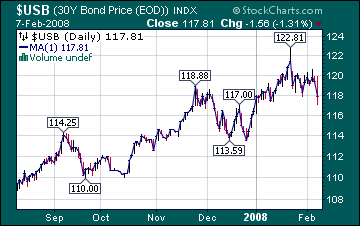 A surprisingly low turnout at the treasury auction yesterday surprised traders. This was startling because the auction was a small one and it was expected that there would be no trouble finding bids for the offering. Foreign central banks appeared to be especially disinterested in submitting bids at this auction. Last week I noted the increasing volatility in bonds and suggested this could not be positive for bonds. The near-term trend is now down.
A surprisingly low turnout at the treasury auction yesterday surprised traders. This was startling because the auction was a small one and it was expected that there would be no trouble finding bids for the offering. Foreign central banks appeared to be especially disinterested in submitting bids at this auction. Last week I noted the increasing volatility in bonds and suggested this could not be positive for bonds. The near-term trend is now down.
Who's in charge here?
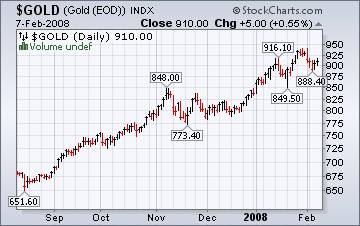 Is it the buyers or the sellers? Last week appeared to be a top of sorts for gold. Despite lower prices a week later, it still isn't evident whether the buyers or the sellers are in charge. Today's news headline trumpets the rise of gold. The World Gold Council anticipates a 30% rise in ownership of the gold exchange traded funds, but caution that continued interest is dependent on new highs in the price of gold bullion.
Is it the buyers or the sellers? Last week appeared to be a top of sorts for gold. Despite lower prices a week later, it still isn't evident whether the buyers or the sellers are in charge. Today's news headline trumpets the rise of gold. The World Gold Council anticipates a 30% rise in ownership of the gold exchange traded funds, but caution that continued interest is dependent on new highs in the price of gold bullion.
The Nikkei ends a very bad week.
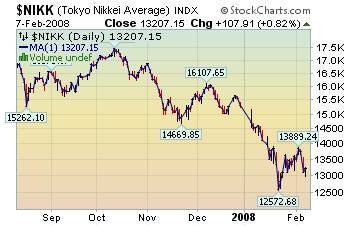
Feb. 8 ( Bloomberg) -- Japanese stocks fell, ending their worst week in a month, led by industrial stocks after machinery orders fell three times more than expected in December.
The Tokyo Stock Exchange halted trading of Topix index futures halfway through the trading day due to a computer malfunction. Transactions stopped on contracts expiring in March at 10:59 a.m. local time, the bourse said in a faxed statement. Hmmm. Do I sense that it could have been worse had they not halted the market?
Shanghai has a relief rally before the festivals.
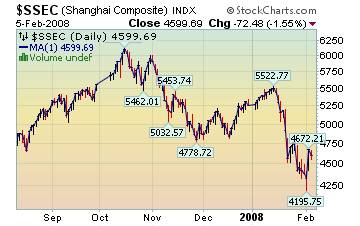 The Shanghai Index had its best one-day rally in over two years on Monday. The markets closed on Wednesday, after giving back some of the gains. It seems that the Chinese are celebrating the Zhonghe Festival and the Blue Dragon Festival, a carryover from its agrarian culture. I wonder what the Shanghai Composite will look like after opening on Monday? Despite the strength of the one-day rally on Monday, the Shanghai market has not changed its down-trend.
The Shanghai Index had its best one-day rally in over two years on Monday. The markets closed on Wednesday, after giving back some of the gains. It seems that the Chinese are celebrating the Zhonghe Festival and the Blue Dragon Festival, a carryover from its agrarian culture. I wonder what the Shanghai Composite will look like after opening on Monday? Despite the strength of the one-day rally on Monday, the Shanghai market has not changed its down-trend.
Mr. Buffett, may I (mis)quote you on that?
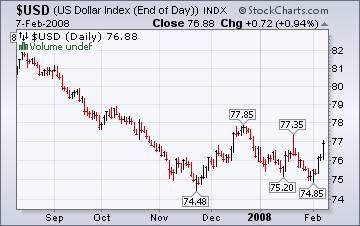 There is a bit of tempest in a teapot about a misquote of a comment made by Mr. Buffett. The headline says, “ Warren Buffett says U.S. dollar 'worthless' if account deficit persists”
There is a bit of tempest in a teapot about a misquote of a comment made by Mr. Buffett. The headline says, “ Warren Buffett says U.S. dollar 'worthless' if account deficit persists”
In his speech, Mr. Buffett said, "If our current account deficit keeps running at present levels, the dollar I think is almost certain to be worth less five to ten years from now compared to other major currencies."
Warren , can we talk?
Exploding ARMS foil Bernanke's attempt to calm the mortgage market.
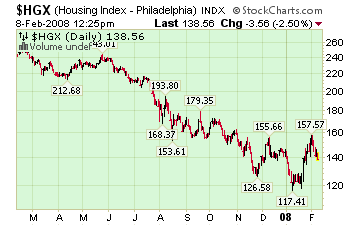
“ Exploding ARMS ” are called the neutron bombs of the housing market. They leave the house standing, but the people are gone. They are also known as “liar loans” because they have been aboused both by people trying to get into houses they otherwise could not afford as well as sales people who glossed over the many intricate details or represented them as fixed rate loans.
Will a recession cause gasoline prices to decline?
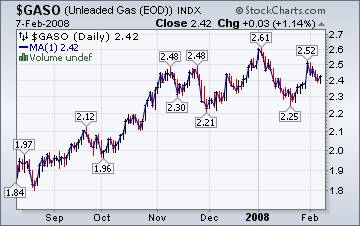 The Energy Information's Weekly Report suggests, “It depends!” A recession in the United States economy will have a significant effect on the demand for petroleum products. However, as oil prices have moved from $3 per barrel in the early 1970s to $90 per barrel today, U.S. firms have found more energy efficient ways to produce goods and services.
The Energy Information's Weekly Report suggests, “It depends!” A recession in the United States economy will have a significant effect on the demand for petroleum products. However, as oil prices have moved from $3 per barrel in the early 1970s to $90 per barrel today, U.S. firms have found more energy efficient ways to produce goods and services.
Arctic blasts put strain on natural gas.
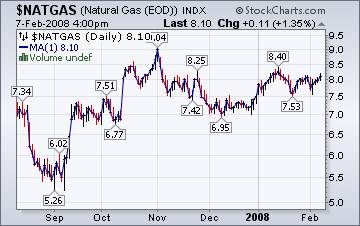 The Natural Gas Weekly Update reports, that natural gas prices decreased in most of the 48 states this week. That was before yesterday's price spike. Due to the weather, last week's draw down of supplies in storage was 200 billion cubic feet (bcf), the second largest draw down of the winter. This still leaves the total natural gas in storage about 3% above the five year average. Another month of winter weather remains. Then the Spring decline in natural gas prices will begin.
The Natural Gas Weekly Update reports, that natural gas prices decreased in most of the 48 states this week. That was before yesterday's price spike. Due to the weather, last week's draw down of supplies in storage was 200 billion cubic feet (bcf), the second largest draw down of the winter. This still leaves the total natural gas in storage about 3% above the five year average. Another month of winter weather remains. Then the Spring decline in natural gas prices will begin.
Message to Americans, “Prepare to live within your means.”
Since the 1960s, the average American consumer became used to the “buy now, pay later” notion promoted by lending institutions. After all, the stock market and real estate market were rising. We could pay back those loans from our appreciating portfolios, if we had to. Consumers are taking notice that this is no longer true.
“ The long collapse in the United States savings rate is over,” said Ethan S. Harris, chief United States economist for Lehman Brothers. “People are going to start saving the old-fashioned way, rather than letting the stock market and rising home values do it for them.”
Thrift is coming back.
We're on the air every Friday.
Tim Wood of www.cyclesman.com , John Grant and I pre-recorded our weekly session on Wednesday about the markets. It was shockingly prescient. You will be able to access the interview by clicking here .
Please make an appointment to discuss our investment strategies by calling Claire or Tony at (517) 699-1554, ext 10 or 11. Or e-mail us at tpi@thepracticalinvestor.com .
Regards,
Anthony M. Cherniawski,
President and CIO
http://www.thepracticalinvestor.com
As a State Registered Investment Advisor, The Practical Investor (TPI) manages private client investment portfolios using a proprietary investment strategy created by Chief Investment Officer Tony Cherniawski. Throughout 2000-01, when many investors felt the pain of double digit market losses, TPI successfully navigated the choppy investment waters, creating a profit for our private investment clients. With a focus on preserving assets and capitalizing on opportunities, TPI clients benefited greatly from the TPI strategies, allowing them to stay on track with their life goals
Disclaimer: The content in this article is written for educational and informational purposes only. There is no offer or recommendation to buy or sell any security and no information contained here should be interpreted or construed as investment advice. Do you own due diligence as the information in this article is the opinion of Anthony M. Cherniawski and subject to change without notice.
Anthony M. Cherniawski Archive |
© 2005-2022 http://www.MarketOracle.co.uk - The Market Oracle is a FREE Daily Financial Markets Analysis & Forecasting online publication.



